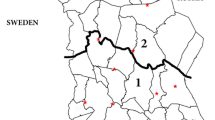Abstract
The welfare of animals during transport should be assessed using a range of behavioural, physiological and carcass quality measures. In addition, health is an important part of welfare so the extent of any disease, injury or mortality resulting from, or exacerbated by, transport should be measured. Many of the indicators are measures of stress in that they involve long-term adverse effects on the individual. Key factors affecting the welfare of animals during handling and transport which are discussed are: attitudes to animals and the need for training of staff; methods of payment of staff; laws and retailers' codes; genetics, especially selection for high productivity, rearing conditions and experience; the mixing of animals from different social groups; handling procedures; driving methods; stocking density; increased susceptibility to disease and increased spread of disease.
Similar content being viewed by others
REFERENCES
Broom, D.M., 1986 Indicators of poor welfare. British Veterinary Journal, 142, 524–526
Broom, D.M., 1998. Welfare, stress and the evolution of feelings. Advances in the Study of Behavior, 27, 371–403
Broom, D.M., 2000. Welfare assessment and problem areas during handling and transport. In: T. Grandin (ed.), Livestock Handling and Transport, 2nd edn, (CABBI, Wallingford), 43–61
Broom, D.M., 2001. Coping, stress and welfare. In: D.M. Broom (ed.), Coping with Challenge: Welfare in Animals including Humans, (Dahlem University Press, Berlin), 1–9
Broom, D.M., 2002. Does present legislation help animal welfare? Landbauforschung Völkenrode, 227, 63–69
Broom, D.M. and Johnson, K.G., 1993 Stress and Animal Welfare, (Kluwer, Dordrecht)
Kenny, F.J. and Tarrant, P.V., 1987. The reaction of young bulls to short-haul road transport. Applied Animal Behaviour Science, 17, 209–227
Knowles, T.G. and Warriss, J., 2000. Stress physiology of animals during transport. In: T. Grandin (ed.), Livestock Handling and T ransport, 2nd edn, (CABI, Wallingford), 385–407
Trunkfield, H.R. and Broom, D.M., 1991. The effects of the social environment on calf responses to handling and transport. Applied Animal Behaviour Science, 30, 177
Author information
Authors and Affiliations
Rights and permissions
About this article
Cite this article
Broom, D. Causes of Poor Welfare in Large Animals During Transport. Vet Res Commun 27 (Suppl 1), 515–518 (2003). https://doi.org/10.1023/B:VERC.0000014210.29852.9a
Issue Date:
DOI: https://doi.org/10.1023/B:VERC.0000014210.29852.9a




